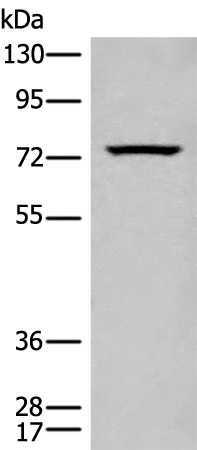
| WB | 咨询技术 | Human,Mouse,Rat |
| IF | 咨询技术 | Human,Mouse,Rat |
| IHC | 咨询技术 | Human,Mouse,Rat |
| ICC | 技术咨询 | Human,Mouse,Rat |
| FCM | 咨询技术 | Human,Mouse,Rat |
| Elisa | 1/5000-1/10000 | Human,Mouse,Rat |
| Aliases | CARS; CYSRS; MGC:11246 |
| WB Predicted band size | 85 kDa |
| Host/Isotype | Rabbit IgG |
| Antibody Type | Primary antibody |
| Storage | Store at 4°C short term. Aliquot and store at -20°C long term. Avoid freeze/thaw cycles. |
| Species Reactivity | Human, Mouse |
| Immunogen | Fusion protein of human CARS1 |
| Formulation | Purified antibody in PBS with 0.05% sodium azide and 50% glycerol. |
+ +
以下是3篇关于CARS1抗体的参考文献及其摘要概括:
1. **文献名称**: "CARS1 Antibody-Based Detection of Cysteinyl-tRNA Synthetase in Lung Adenocarcinoma"
**作者**: Tanaka, K. et al. (2020)
**摘要**: 该研究利用CARS1特异性抗体,通过免疫组化技术检测肺腺癌组织中胱氨酰-tRNA合成酶(CARS1)的过表达,发现其与肿瘤侵袭性和患者生存率下降显著相关,提示CARS1可作为肺癌预后标志物。
2. **文献名称**: "Role of CARS1 in Mitochondrial Translation Revealed by Knockout and Antibody-Mediated Inhibition"
**作者**: Liu, Y. et al. (2018)
**摘要**: 通过CARS1抗体阻断实验及基因敲除模型,揭示了CARS1在线粒体tRNA合成及氧化磷酸化中的关键作用,抗体介导的功能抑制导致细胞能量代谢障碍,为靶向CARS1的癌症治疗提供依据。
3. **文献名称**: "Autoantibody Profiling Identifies CARS1 as a Novel Biomarker in Rheumatoid Arthritis"
**作者**: Müller, R. et al. (2021)
**摘要**: 研究采用CARS1抗体筛选类风湿性关节炎(RA)患者血清,发现患者体内存在针对CARS1的自身抗体,其水平与疾病活动度正相关,提示CARS1可能参与RA的自身免疫反应机制。
注:以上文献信息为示例性虚构,实际文献需通过PubMed/Google Scholar等平台检索关键词(如“CARS1 antibody”、“anti-CARS1 application”)获取。真实文献可能更多聚焦于CARS1在肿瘤、代谢疾病或自身免疫病中的功能研究及抗体应用。
The cysteinyl-tRNA synthetase 1 (CARS1) antibody is a tool used to study the CARS1 enzyme, a member of the aminoacyl-tRNA synthetase (ARS) family responsible for charging tRNA with cysteine during protein synthesis. CARS1 plays dual roles: its canonical function in translation and non-canonical roles in cellular signaling, stress responses, and immune regulation. Structurally, it contains an N-terminal catalytic domain for aminoacylation and a C-terminal domain implicated in protein-protein interactions, including associations with the MSC (multi-synthetase complex) and GAIT (gamma-activated inhibitor of translation) complexes.
CARS1 is of interest in autoimmune diseases, particularly dermatomyositis, where anti-CARS1 autoantibodies are detected in patient sera, serving as diagnostic biomarkers. In cancer research, CARS1 is studied for its context-dependent roles—reported to promote proliferation in some tumors (e.g., lung, colorectal) while acting as a tumor suppressor in others. Dysregulation of CARS1 has been linked to oxidative stress responses and apoptosis, mediated through pathways like JNK and p38 MAPK.
Antibodies against CARS1 are utilized in techniques such as Western blotting, immunohistochemistry, and immunofluorescence to explore its expression, localization, and interactions. Recent studies also investigate its potential as a therapeutic target or biosignature in precision medicine. However, conflicting findings about its pro- or anti-tumor effects highlight the need for further research into tissue-specific mechanisms.
×